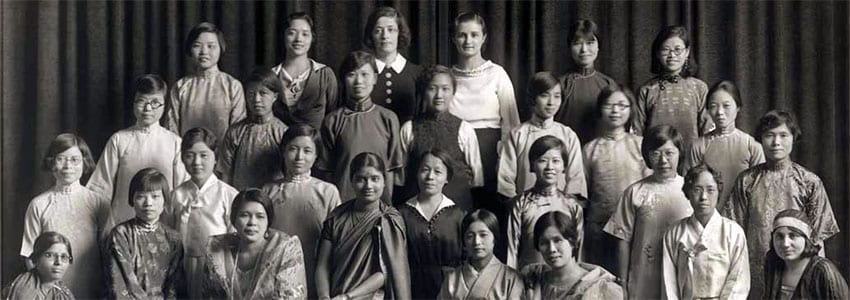I spent this past summer as an intern for Rackham Graduate School working on programming around the Barbour Scholarship. U-M Regent Levi Barbour endowed this scholarship in 1917 after meeting three women in Japan and China, who were educated at the University of Michigan, making impressive contributions in their fields. My work has included researching past Barbour Scholars, reaching out to hear Barbour Scholars’ stories, and starting to plan for the centennial of the scholarship in 2017.
This ended up being a really fascinating summer. I expected this work to be interesting and challenging, but what I did not know coming in was how inspiring it would be. Knowing the stories of the Barbour Scholars has made me proud to be even a small part of this program. These nearly 700 women over the past 100 years have truly made an impact across so many countries and fields of study.
For example, not one, but two Philippine Senators were Barbour Scholars. Maria Kalaw Katigbak graduated from the University of Michigan with an M.A. in Literature in 1935. She was only the second woman to serve on the Philippine Senate. She was also the Queen of the Manila Carnival in 1931, the equivalent of Miss Philippines. She was very active in improving the public good and acted as the national president of the Girl Scouts of the Philippines.
More recently, Miriam Santiago served in all three branches of the Philippine government. She was voted one of the 100 most powerful women in 2014 by The Australian. She is devoted to fighting for the people of her country with honesty and is having remarkable success.
Another illustrious alumna of the Barbour Scholarship is Veena Sahajwalla. She graduated in 1992 and is a leader in sustainability initiatives in her country. As Director of the Centre for Sustainable Materials Research & Technology at the University of New South Wales, she is constructing new ways to turn waste into usable product.
I also sent out a survey to gauge interest in the Barbour centennial celebration and to hear about Barbour Scholars’ experiences at U-M. The feedback was incredible. Parinaz Naghizadeh wrote, “The Barbour Scholarship was not merely a source of funding for me, but it gave me a sense of pride to belong to this community of accomplished women, and it has given me encouragement and motivation to do my best to be a good representative of this amazing group.” The responses and excitement from these women showed how truly influential this scholarship has been for each recipient.
Learning the stories of these women and how much the Barbour Scholarship influenced their time at the University of Michigan and careers showed me how much impact one person could have. Levi Barbour made a gift to the University of Michigan almost 100 years ago and that has since impacted 700 women, their communities, and their fields of study. We are living in a better world than when Levi Barbour originally donated the funds for this scholarship because women like Maria Kalaw Katigbak, Miriam Santiago, and Veena Sahajwalla are fighting for things they believe in. After spending the summer engrossed in the stories of the Barbour Scholars, I am inspired to explore my passions, continue my education, and do my part to make a difference in the world.

